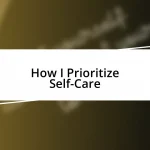Key takeaways:
- Understanding a child’s emotional needs often involves observing their behaviors and creating safe spaces for open communication.
- Building a strong support network, including friends, family, and school staff, is crucial for advocating effectively for a child’s health.
- Preparation and effective communication with healthcare providers enhance the advocacy process and ensure comprehensive care.
- Empowering children to participate in their health journey fosters confidence and turns appointments into collaborative experiences.

Understanding Your Child’s Needs
Understanding your child’s needs goes far beyond just listening to their words; it’s about tuning into their emotions and behaviors. I often find myself reflecting on moments when my child would come home from school, unusually quiet. These subtle cues often hinted at something deeper, a feeling or need that words couldn’t express. Have you ever experienced this with your child? It’s in those quiet moments that I’ve learned the most about what they truly need.
In my experience, engaging with my child during daily routines has opened up a treasure trove of insights. For instance, during bath time, as the water splashed and the bubbles floated, my child would share fears or concerns that seemed to come out of nowhere. It’s fascinating how safe environments can encourage them to talk freely. I realized that those seemingly trivial moments are crucial for understanding their mental and emotional states.
I’ve also found that keeping a journal of my child’s habits, moods, and preferences helps in recognizing patterns. Once, when I noted that my child became anxious before certain activities, it prompted me to explore the root cause. Did it stem from a particular experience, or was it something more general? This practice not only assists in understanding their needs better but also in advocating effectively for their health. It’s amazing how a simple habit can lead to deeper connections and insights!

Building a Support Network
Building a support network is essential in ensuring a holistic approach to my child’s health. Friends, family, and health professionals each play a vital role in this journey. I recall a time when a close friend shared her experience navigating the pediatric healthcare system. Her insights helped me understand what questions to ask during appointments, and I could feel the weight lift off my shoulders knowing I wasn’t alone in this.
Involving school staff is another crucial aspect I’ve embraced. Once, I reached out to my child’s teacher about some behavioral changes I noticed. To my surprise, the teacher had observed similar patterns, and we teamed up to create strategies tailored for my child. This collaboration made such a difference. It reinforced my belief that building a strong support network is about connecting the dots among different environments to promote my child’s well-being.
Ultimately, I’ve learned that sharing experiences with other parents can be incredibly empowering. I attend a local support group where we exchange stories and resources. In one meeting, one mom’s experience with dietary changes sparked ideas for my child’s nutrition. It’s incredible how these small connections can lead to significant changes in our children’s lives. Sometimes, reaching out is all it takes to ignite a chain reaction of support and understanding.
| Support Network Components | Impact on Child’s Health |
|---|---|
| Friends and Family | Emotional support and real-life insights |
| Health Professionals | Expert guidance and tailored care |
| Teachers and School Staff | Support in social and academic settings |
| Parent Support Groups | Resource sharing, emotional uplift |

Communicating with Healthcare Providers
Communicating with Healthcare Providers
Navigating conversations with healthcare providers can sometimes feel daunting. I remember the first time I took my child to a specialist; my anxiety was palpable. I made a conscious effort to prepare thoroughly, jotting down my child’s symptoms and any relevant history. That preparation paid off, as it equipped me to articulate their needs clearly. Having a roadmap makes it easier to guide these important discussions, making sure nothing is overlooked.
It’s crucial to establish rapport with the healthcare team. I often find that asking open-ended questions fosters a more engaging dialogue. Instead of simply asking, “Is this treatment effective?” I might say, “What are the benefits and potential risks of this approach?” This not only deepens my understanding but also shows that I value their expertise. Below are some communication tips that I’ve found particularly effective:
- Be Prepared: List your child’s symptoms, concerns, and any relevant medical history before the appointment.
- Ask Questions: Don’t hesitate to clarify medical jargon. Understanding terms like “asthma exacerbation” can make a significant difference in how we respond.
- Be Honest: Share your observations about your child’s behavior and emotions. Transparency helps providers grasp the full picture.
- Take Notes: Recording what the provider says can help you remember the details and share them with other caregivers.
- Follow Up: If I feel uncertain after the appointment, I don’t hesitate to call or email for clarification. It’s part of an ongoing dialogue about my child’s health.

Keeping Track of Medical Records
Keeping track of medical records is a vital part of advocating for my child’s health. I decided to create a dedicated binder for all of my child’s health-related documents, from immunization records to specialist visit summaries. Each time we visit a doctor, I make it a habit to ask for a printed copy of the visit notes. It’s amazing how much easier it is to manage their health when everything is organized in one place.
One evening, while sorting through the binder, I stumbled upon an old allergy report I had nearly forgotten about. It reminded me of the importance of keeping historical information handy. I realized that having that document at my fingertips could lead to better-informed discussions about potential treatments and help prevent any overlooked allergies in the future. This level of preparedness can make a significant difference during appointments, allowing us to reference past experiences when making decisions.
I sometimes wonder how many parents overlook the importance of their child’s medical history. Balancing school, work, and family responsibilities can be overwhelming, but keeping track of these records ensures that nothing falls through the cracks. I’ve found that not only am I more confident in appointments, but healthcare professionals also appreciate the comprehensive information I provide. That connection fosters a collaborative approach to my child’s care, turning our health management into a true partnership.

Researching Health Conditions
Researching health conditions is a crucial step in advocating for my child’s health. I still recall the sleepless night I spent diving into articles and studies after my child’s diagnosis. It felt overwhelming, but I soon discovered a wealth of information that helped me understand the nuances of the condition. I realized that grasping the medical terminology wasn’t just about knowledge; it was about empowerment.
When I came across an online support group, it was a game-changer. Hearing from other parents facing similar challenges provided both insight and camaraderie. Their shared experiences illuminated paths I hadn’t considered. It made me wonder: how many parents might feel isolated in their journey? Finding those communities helped me feel less alone and more equipped to advocate effectively for my child’s needs.
As I sought out reputable sources, I learned to differentiate between reliable information and overwhelming noise. I remember one late evening, poring over clinical studies that felt dense and complex. Yet, I found that breaking down the information—even making my own notes—clarified things immensely. Isn’t it fascinating how delving deeper into a topic can transform our understanding? This approach not only readied me for conversations with healthcare providers but also helped me make informed decisions about my child’s treatment options.

Empowering Your Child’s Involvement
Empowering my child’s involvement in their health journey has been a transformative experience for both of us. I remember the first time I asked my child their opinion about a treatment plan. Their wide-eyed look of surprise followed by a burst of excitement taught me just how much they wanted to be part of the conversation. It became clear that involving them not only increased their understanding of their condition but also instilled a sense of control and responsibility.
I often find myself turning routine appointments into discussions that welcome their input. For example, during a recent visit, I encouraged my child to express how they felt about a new medication. Their candid feedback shifted the tone of the appointment, turning it into a two-way dialogue. I realized that not only does this build their confidence, but it also arms me with the insights needed to better advocate for them. After all, who knows their feelings and preferences better than they do?
It’s hard not to feel a sense of pride when I see my child confidently asking questions during doctor visits. I wonder, have you seen a similar change in your child when they feel heard? Encouraging this level of participation has allowed us to partner in their care. Together, we navigate their health journey, transforming potential anxiety into empowerment. By embracing their involvement, we’ve created an environment where their voice matters, making each appointment not just my responsibility but a shared commitment to their well-being.

Advocating for School Health Services
Advocating for school health services has been an essential part of my approach to ensuring my child’s well-being. I remember the first time I reached out to the school nurse after learning about my child’s needs. I felt a mix of anxiety and determination, knowing that forming a partnership with the school was crucial for effective care. Have you ever considered how the school environment can significantly impact a child’s health? In my case, it became clear that the right support in school could make a world of difference.
Every time I attend school meetings or parent-teacher conferences, I make it a point to discuss available health services. I recall a specific meeting where I shared my concerns about my child’s access to mental health resources. The school staff was receptive, and to my surprise, many were not even aware of the gaps. This experience reinforced my belief that advocating isn’t just about voicing needs; it’s also about creating awareness. Who else will educate those in charge if not us, the parents?
Moreover, I actively encourage other parents to join me in this advocacy. I organized a small group discussion with fellow parents to talk about health issues affecting our children and how we could collectively approach the school. I’ll never forget the sense of unity we felt as we shared our experiences. It sparked conversations with school administrators that wouldn’t have happened otherwise. It makes me wonder, isn’t it remarkable how collaboration amplifies our voices? Together, we can advocate for a healthier environment, ensuring that our children thrive both academically and physically.














